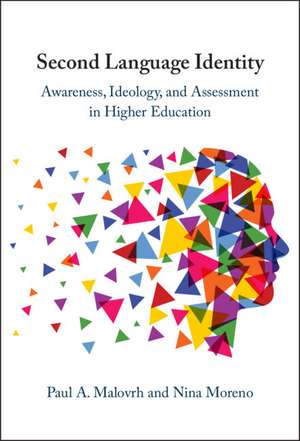Second Language Identity: Awareness, Ideology, and Assessment in Higher Education
Autor Paul A. Malovrh, Nina Morenoen Limba Engleză Hardback – 9 aug 2023
Preț: 700.29 lei
Preț vechi: 814.29 lei
-14% Nou
Puncte Express: 1050
Preț estimativ în valută:
133.100€ • 140.28$ • 110.88£
133.100€ • 140.28$ • 110.88£
Carte tipărită la comandă
Livrare economică 07-21 aprilie
Preluare comenzi: 021 569.72.76
Specificații
ISBN-13: 9781107173132
ISBN-10: 1107173132
Pagini: 320
Dimensiuni: 158 x 235 x 22 mm
Greutate: 0.59 kg
Editura: Cambridge University Press
Colecția Cambridge University Press
Locul publicării:New York, United States
ISBN-10: 1107173132
Pagini: 320
Dimensiuni: 158 x 235 x 22 mm
Greutate: 0.59 kg
Editura: Cambridge University Press
Colecția Cambridge University Press
Locul publicării:New York, United States
Cuprins
Preface; Acknowledgements; List of Figures; List of Tables; 1. On Actors, Architecture, and L2 Advancedness in Higher Education; Part I. Advancedness and the L2 Learner: Student Beliefs and Awareness Regarding Advancedness; 2. Advancedness, Advanced Proficiency, and L2-Spanish Learner Identity; 3. A Quantitative Analysis of L2 Learners' Beliefs Regarding Advanced L2- Spanish and Their Perceptions of Advancedness; 4. Can L2 Learners Imagine Advancedness? A Qualitative Study of Language Awareness and the Development of L2 Identity; Part II. Variable Notions of Advancedness: Institutional, Professional, and Social Perspectives; 5. Language Departments' Architecture, Ideology, and Mission Regarding L2 Advancedness; 6. A Quantitative Analysis of Variability in Perceptions of L2 Advancedness Among Practitioners, Researchers, and Administrators in Higher Education; 7. A Qualitative Analysis of Language Professionals' Descriptions of Their Ideology and Assessment of Advanced L2 Spanish; Part III. Assessment, Identity, and Critical Language Awareness as Markers of Advancedness: 8. Assessing Advancedness in the Age of Identity Construction and Global Citizenship; 9. A Quantitative Analysis of L2 Identity and Critical Language Awareness; 10. Imagining Global Citizenship and Intercultural Competence: A Mixed-Methods Analysis of L2 Learner Perceptions and Behavior in Contexts of Identity Co-Construction; 11. Sociocognitive Awareness of L2 Advancedness in Higher Education: A New Parlance for a Changing World; Bibliography; Appendices; Index.
Recenzii
'What happens when we ask L2 students to define 'advancedness'? The response is in Malovrh and Moreno's book, and it's fascinating. Through qualitative and quantitative analyses of learners' beliefs and perceptions of advancedness, the authors capture the way the educational system constrains the relative contribution that linguistic features, critical language awareness, intercultural competence, global citizenship, and learner identity make to the definition of advancedness among undergraduate students in language programs in the US.' Cristina Sanz, Georgetown University
'What a great pleasure to read this innovative and thorough treatment of advancedness in second language acquisition. Malovrh and Moreno have pulled together an impressive coverage of the topic from a wide variety of perspectives, building on past research and including their own vision of the construct. Their journey through this topic has an emphasis on sociocognitive aspects of language learning within higher education programs and covers an impressive array of topics that includes identity, cultural studies, beliefs, actual practice, and assessment, to give a small example. This book will be of enormous interest and benefit to anyone interested in L2 advancedness, including researchers and higher education administrators.' Susan Gass, University Distinguished Professor Emerita, Michigan State University
'What a great pleasure to read this innovative and thorough treatment of advancedness in second language acquisition. Malovrh and Moreno have pulled together an impressive coverage of the topic from a wide variety of perspectives, building on past research and including their own vision of the construct. Their journey through this topic has an emphasis on sociocognitive aspects of language learning within higher education programs and covers an impressive array of topics that includes identity, cultural studies, beliefs, actual practice, and assessment, to give a small example. This book will be of enormous interest and benefit to anyone interested in L2 advancedness, including researchers and higher education administrators.' Susan Gass, University Distinguished Professor Emerita, Michigan State University
Notă biografică
Descriere
By establishing a new framework for discussing L2 advancedness, this book presents a more effective way of adapting to globalization.
